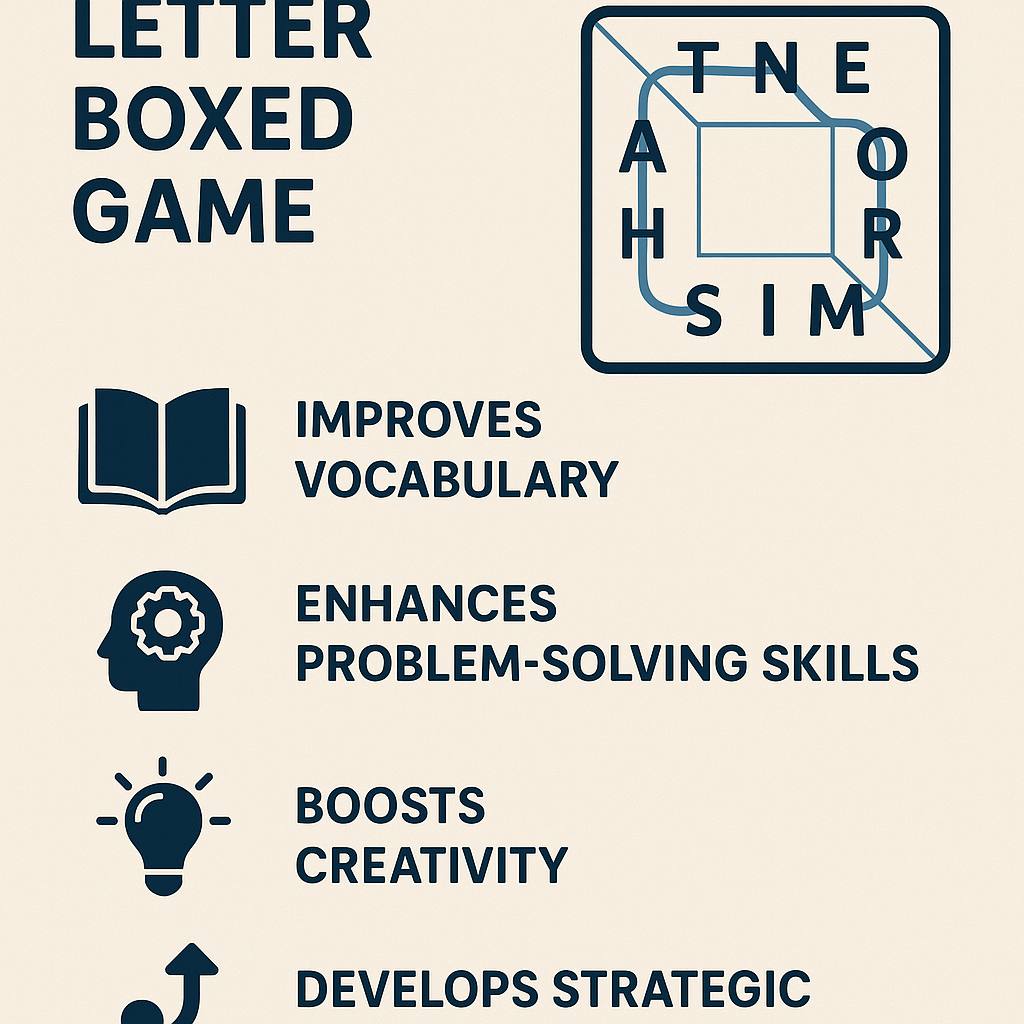Introduction
Letter Boxed is a unique word puzzle game that has gained popularity among enthusiasts and casual players alike. It combines elements of strategy, vocabulary, and critical thinking, making it not only an engaging pastime but also a beneficial cognitive exercise. This article aims to explore the various advantages of playing Letter Boxed games, discussing how they can enhance mental acuity, foster social interaction, and contribute to overall well-being.
The Mechanics of Letter Boxed Games
Before delving into the benefits, it is essential to understand the mechanics of Letter Boxed games. The game typically involves:
- A set of letters arranged in a square or rectangular format.
- Players must create words using the letters provided, adhering to specific rules.
- The goal is to maximize the number of words formed within a limited time or number of moves.
This structure encourages players to think creatively and strategically as they navigate through the constraints of the game.
Cognitive Benefits
Playing Letter Boxed games can significantly enhance cognitive abilities. Here are some of the key cognitive benefits:
1. Improved Vocabulary
Engaging with Letter Boxed games exposes players to new words and enhances their existing vocabulary. This is particularly beneficial for:
- Language learners looking to expand their linguistic repertoire.
- Individuals seeking to improve their communication skills.
- Students preparing for verbal assessments and standardized tests.
2. Enhanced Problem-Solving Skills
The strategic nature of Letter Boxed requires players to think critically and solve problems. This can lead to:
- Better analytical skills in real-life situations.
- Improved ability to approach challenges methodically.
3. Memory Enhancement
Playing word games stimulates memory retention as players must recall words and their meanings. This can lead to:
- Better short-term and long-term memory.
- Increased cognitive flexibility.
4. Concentration and Focus
Letter Boxed requires sustained attention and concentration. Players must:
- Focus on the available letters.
- Consider different combinations to form words.
This practice can translate to improved focus in other areas of life, enhancing productivity.
Social Benefits
Aside from cognitive advantages, Letter Boxed games also offer various social benefits. These include:
1. Encouraging Teamwork
When played in groups, Letter Boxed fosters collaboration. Players must work together to:
- Share strategies for word formation.
- Encourage each other in a competitive setting.
This teamwork can strengthen interpersonal relationships and improve social skills.
2. Facilitating Communication
Playing Letter Boxed can enhance communication skills, as players must articulate their thoughts and ideas clearly. This leads to:
- Improved verbal skills.
- Greater confidence in public speaking.
3. Building Community
Letter Boxed games are often played in social settings, creating a sense of community among players. This can result in:
- Stronger bonds with friends and family.
- A sense of belonging in social circles.
Emotional and Psychological Benefits
Engaging in Letter Boxed games can also have several emotional and psychological benefits, which include:
1. Stress Relief
Playing word games provides a mental escape, allowing players to unwind and relax. This can lead to:
- Reduced levels of anxiety.
- Improved overall mood.
2. Boosting Self-Esteem
Successfully forming words and achieving high scores can boost players’ confidence and self-esteem. This results in:
- A greater sense of accomplishment.
- Increased motivation to tackle other challenges.
3. Fostering a Growth Mindset
Letter Boxed encourages players to learn from mistakes and strive for improvement. This promotes:
- A willingness to take risks.
- A belief in the ability to develop skills over time.
Conclusion
In summary, Letter Boxed games offer a multitude of benefits that extend beyond mere entertainment. From enhancing cognitive functions and fostering social interaction to providing emotional support and boosting self-esteem, the advantages of engaging with this word game are extensive. As individuals and communities continue to seek innovative ways to stimulate mental engagement and foster relationships, Letter Boxed remains an exemplary choice for promoting wellness and cognitive development.
FAQs
1. What age group is Letter Boxed suitable for?
Letter Boxed is suitable for a wide range of age groups, including children, teenagers, and adults, making it an excellent family game.
2. Can Letter Boxed be played online?
Yes, many platforms offer Letter Boxed games online, allowing players to compete against others globally.
3. Is there a time limit for playing Letter Boxed?
Time limits vary depending on the platform or version of the game. Some versions allow players to take their time, while others may impose time constraints.
4. How can I improve my performance in Letter Boxed?
To improve performance, players should practice regularly, expand their vocabulary, and develop strategic thinking skills.
5. Are there any educational benefits to playing Letter Boxed?
Yes, Letter Boxed can enhance vocabulary, spelling, and critical thinking skills, making it a useful educational tool.
6. Can I play Letter Boxed alone?
Yes, Letter Boxed can be played solo, which allows for self-paced learning and practice.
7. How does Letter Boxed compare to other word games?
Letter Boxed combines elements of strategy and problem-solving that may not be present in other word games, offering a unique gaming experience.

Leave a Reply